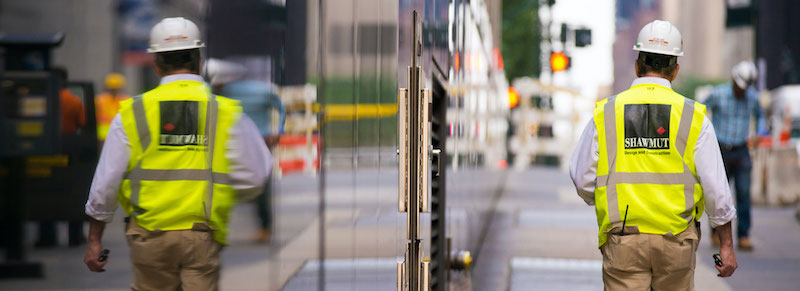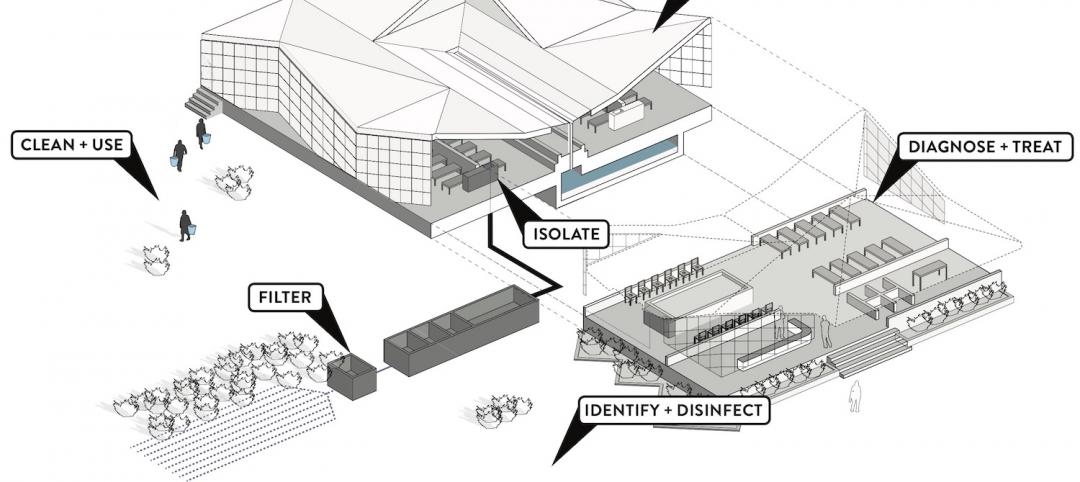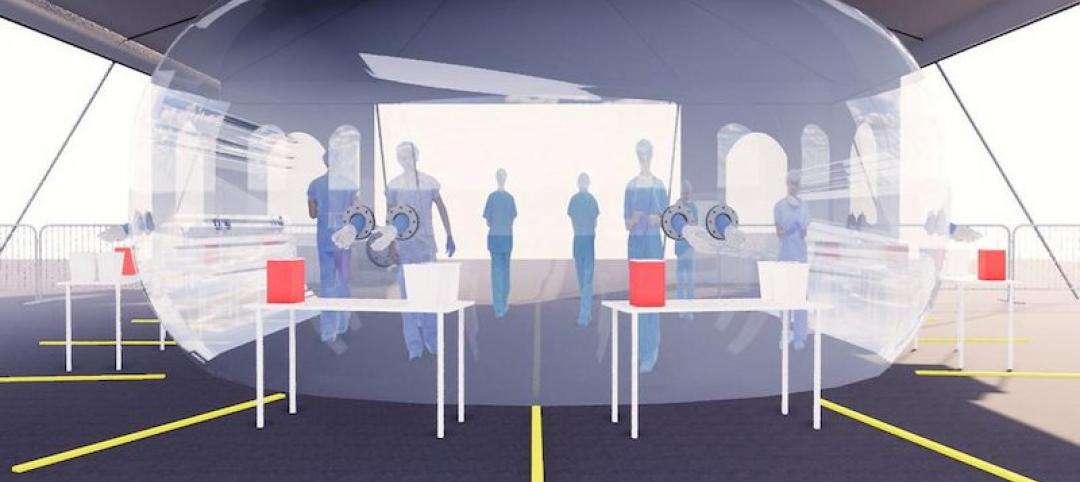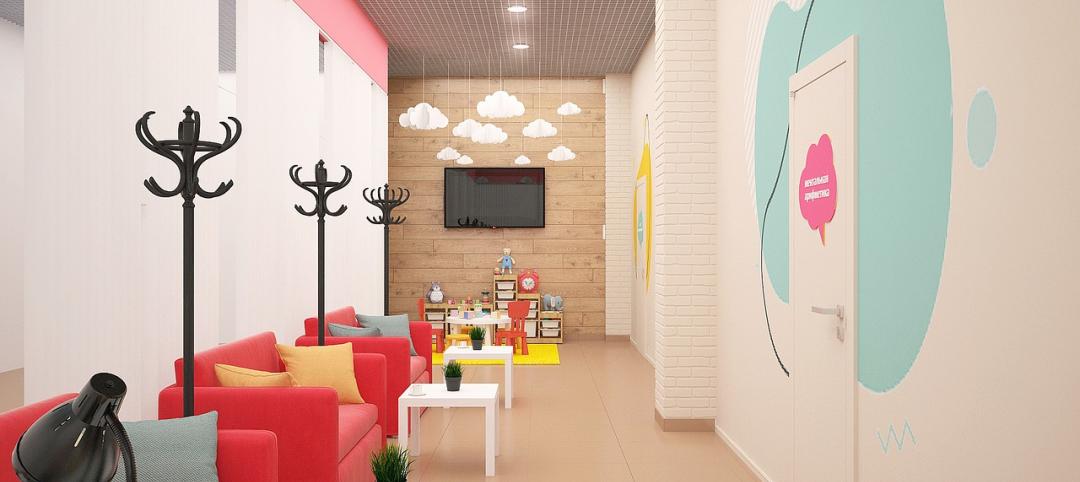As states start reopening their economies, and building reactivates, construction firms are giving more serious thought to how they can provide a safer environment for their employees and subs.
Boston-based Shawmut Design and Construction, in collaboration with trade unions, industry peer groups, and other firms, has rolled out a COVID-19 safety plan for its project sites across the country.
“The coronavirus has very quickly required a drastic change to the world, and specifically, to our construction industry,” says Les Hiscoe, Shawmut’s CEO. “Through technology partnerships, pilot programs, and grassroots innovation by our project team members in the field, we have created efficient, enhanced safety guidelines. Protecting our employees and everyone on our jobsites is our top priority, so we are engaging in real-time, adapting to our new environment’s requirements almost instantly, and never missing a beat.”
SHAWMUT MAXIMIZES TECHNOLOGY PLATFORMS
The plan includes safety protocols, new jobsite innovation, and COVID-19 risk assessment and response. Shawmut has developed a new custom technology platform that’s designed to check for COVID-19 symptoms and to manage contact tracing.
Called Shawmut Vitals, the platform allows employees and subs to self-certify daily health screenings by scanning a job-specific QR code, and then filling out a health survey. Employees who are symptomatic or have been exposed to someone who’s infected or at-risk will be flagged for further care or action.
Team members can access information on their mobile devices.
Also See: Nonresidential construction spending declines in March as pandemic halts projects
Shawmut has also mobilized platforms and technologies like SmartVid.io and Feevr to monitor safety compliance, enforce social distancing, and screen personnel for fevers.
The firm’s plan outlines stringent guidelines for self-awareness and reporting. A dedicated COVID-19 officer will be on site 100% of the time to enforce protocols, which include limiting any worker gatherings to no more than five people. Crews might be minimized and work shifts staggered.
Health screening guidelines, self-reporting, and all best practices will be reviewed regularly and reinforced with on-site signage, written in English and Spanish and located in high-traffic areas. Shawmut will ensure that an adequate amount of hand-washing stations will be available throughout all sites, with each unit at least six feet apart. For tasks that require more than one person for completion, additional PPE will be required.
JOBSITE INFECTION CONTROL REQUIRES EDUCATION AND TRAINING
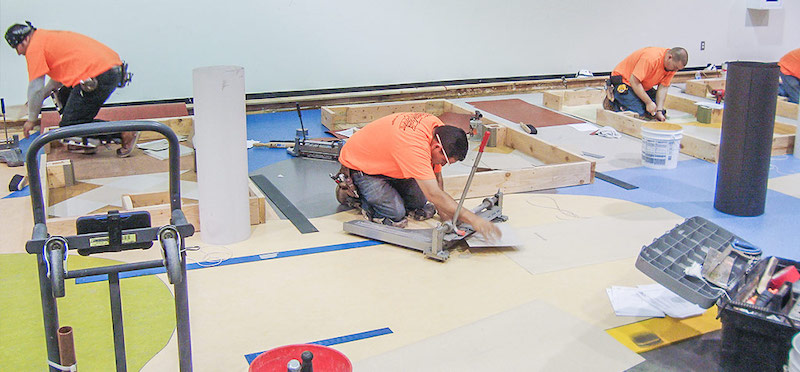
Following infection-control guidelines has been central to the safety and health of flooring installation professionals. Image: International Standards and Training Alliance
John T. McGrath, Jr., Executive Director of the International Standards and Training Alliance (INSTALL), an industry-endorsed floorcovering installation training and certification program, points out in a recent essay that floorcovering professionals have long understood the importance of health and safety on the jobsite, as spelled out in Infection Construction Risk Assessment (ICRA) standards and protocols, which are now being applied to battle the spread of COVID-19.
Compliance with ICRA standards and protocols helps safeguard patients from potential contaminants during renovation or construction of healthcare projects.
McGrath points out that the United Brotherhood of Carpenters’ ICRA course teaches techniques for containing pathogens, controlling airflow, protecting patients, and for completing work without disrupting adjacent operations.
As COVID-19 began to spread in North America, the union worked with ICRA to expedite an online short course for contractors in the field. INSTALL (which is the union’s floorcovering arm) works with contractors to employ ICRA so construction teams can classify work areas to minimize risk, adhere to protocols, and communicate to the facility’s team.
COVID-19 RELATED PRIORITIES FOR CONTRACTORS AND EMPLOYEES
Different states had different criteria for allowing construction to proceed during the pandemic. In markets where construction was deemed essential, “ICRA certification has played a major role in helping healthcare systems find and specify trained contractors in [their] region,” says DeAnn Richards, Infection Preventionist and ICRA Consultant, North Central States Regional Council of Carpenters.
Also See: Apartment Firms’ Reactivation Plans Begin to Take Shape
Jayson Karas, that Council’s ICRA Facilitator, notes that major contractors with ICRA training and experience have stepped up to create a roundtable and discussion forum within the six-state region. “They were prepared ahead of time for this crisis by working with hospital networks to take stock of PPE and necessary equipment like HEPA filters,” Karas states.
Rick Okraszewski, Industry Outreach/ICRA (retired) for the Eastern Atlantic States Regional Council of Carpenters, says that his Council has provided training for more than a dozen years. “The new curriculum adds nuance surrounding COVID-19,” he says.
Aside from ICRA compliance, McGrath says there are some simple procedures that construction professionals can follow to curtail the spread of disease on jobsites. The first step, he says, is to develop a COVID-19 response team with representations from all levels of the organization. Contractors should also create a company specific COVID-19 response plan, and ensure that each jobsite has a safety committee.
Prohibit gatherings of more than 10 people, and provide necessary hygienic supplies including handwashing stations, cleaning/disinfectant solutions, portable toilets, and barrier-free trash receptacles.
McGrath adds that one of the most important things that foremen and project managers can do right now is to monitor employee health and send ill workers home. They should also ensure that common areas and items are cleaned and disinfected regularly.
Related Stories
Coronavirus | Jul 31, 2020
The Weekly show: Microhospitals, mass timber, and the outlook for 5 key building sectors
The July 30 episode of BD+C's "The Weekly" is available for viewing on demand.
University Buildings | Jul 24, 2020
A hybrid learning approach could redefine higher education
Universities reassess current assets to determine growth strategies.
Coronavirus | Jul 20, 2020
Student housing amid the pandemic, infection control in buildings, and future airport design on "The Weekly"
Experts from Core Spaces, Bala Consulting Engineers, and Populous were interviewed in the July 23 streaming program from Horizon TV.
Coronavirus | Jul 17, 2020
Never waste a crisis
The coronavirus outbreak has provided numerous lessons for AEC firms.
Coronavirus | Jul 17, 2020
The Weekly show: What 40K workers have to say about WFH, and design in the digital age
This week on The Weekly, BD+C editors spoke with leaders from Cushman & Wakefield, HMC Architects, and HOK on three timely topics.
Coronavirus | Jul 14, 2020
Is there a way to test for Covid-19 without PPE?
We developed a unique design concept: a testing booth that allows healthcare workers to administer tests without using PPE or being exposed.
Coronavirus | Jul 13, 2020
4 technologies for improving building sanitization in a post-pandemic society
Changes in building design and operations can drastically improve public health and safety.
Coronavirus | Jul 10, 2020
HOK, Cushman & Wakefield, and HMC Architects hold sway on July 16 "The Weekly"
“The Weekly,” a new streaming program for the commercial design and construction industry, to feature experts from HOK, Cushman & Wakefield, and HMC Architects. Tune in July 16 for insight on social media and interior design, the future of the workplace, and healthcare design after COVID-19.
Coronavirus | Jul 10, 2020
The Weekly show: Carbon-fiber reinforced concrete buildings and back to campus amid COVID-19
The July 9 episode of BD+C's "The Weekly" is available for viewing on demand.
Coronavirus | Jul 1, 2020
Are hospitals prepared for the next pandemic?
Caught off guard by COVID-19, healthcare systems take stock of the capacity and preparedness.


